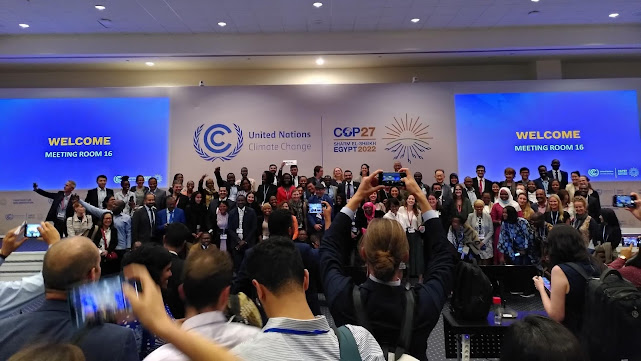The 27th session of the United Nations Conference on Climate Change “COP27” is going to conclude after hours following many other hours full of drama, political, and economic talks about the future of Planet Earth's environment in Egypt’s Sharm El-Sheikh.
 |
| At the loss and damage meeting in the COP27 on Wednesday in Sharm |
In the past 48 hours, news reports came that we as people from the developing countries in the global South should not have our hope high because it seems the conclusions and recommendations as well as pledges of the globe North will be less impressive of the COP27 than the conclusions, recommendations and pledges announced in COP26.
According to official and unofficial sources openly and off the records there are divisions about issues including whether rich nations should set up a fund to cover irreparable damage being wrought by climate change, language addressing fossil fuels use and whether 1.5C should remain the explicitly targeted limit for planetary warming.
The current President of COP Egypt welcomed on Wednesday the commitments made by the G20 nations at their summit in Indonesia related to the 1.5-degree pledge
The leaders of the G20 announced that they agreed to pursue efforts to limit the rise in global temperatures to 1.5 degrees Celsius and recognized the need to speed up efforts to phase down coal use in accordance with the Paris agreement.
To put it simply if the earth's temperature went up by 1.5 C , it will be the start of very bad things for earthlings
U.S. Special Climate Envoy John Kerry said on Saturday that there are some few countries resisting mention of the 1.5C goal in the official text of the COP27 summit without remaining them.
We are not speaking about the countries but also about the fossil fuel companies’ lobbyists currently in COP27. There are about 636 fossil fuel lobbyists not messing around in Sharm El-Sheikh.
Kerry also made it clear that the US once again is standing against establishing a fund for loss and damage as it believes existing platforms should be used.
Former Irish President and head of the Elders Mary Robinson expressed her concern on Wednesday at the state of talks at the COP27 summit on planned measures to address loss and damage suffered by poorer countries because of climate change.
Robinson stated that Saudi Arabia and China “not in the global north” were holding up the talks on technical assistance going to the most vulnerable countries.
Late Wednesday, we knew that all parties at COP27 agreed on the institutional arrangements to operationalize the Santiago Network for loss and damage to provide technical assistance to communities and countries impacted by loss and damage.
The Santiago Network for Loss and Damage was established to connect developing countries with providers of technical assistance, knowledge and resources according to what I have read online.
India, the world's second-biggest buyer of coal, wants countries to agree to phase down all fossil fuels rather than phasing down coal which was agreed upon at COP26 last year.
FYI, the loss and damage caused by climate change are not limited only to the global south, the global north has its own bitter share, but it is felt more by the poorer countries already struggling in the south. Here is a list of the top ten rising costs of climate disasters.
Now some of the important numbers said in the COP27 I stumbled upon:
- Climate and weather-related disasters have increased by 40% over the last 20 years.
- 80% of the people displaced due to climate change are women.
- Land-based ecosystems have absorbed 31% of man-made CO2 emissions over the past 10 years.
- Nature has absorbed 54% of man-made CO2 over the past 10 years.
- The United States is falling $32 billion short on its fair short of the $100 billion climate finance goal.
Remember We have not yet been defeated.
We will see what will happen on Thursday and Friday regarding other issues.

I think the biggest problem by far with compensating money from the North to the development countries is to whom it will be handed over. I mean, if it is paid to the presidents, higher ranked people, or governments of those countries it will neither reach the climate nor the population of such a country, I’m afraid.
ReplyDelete